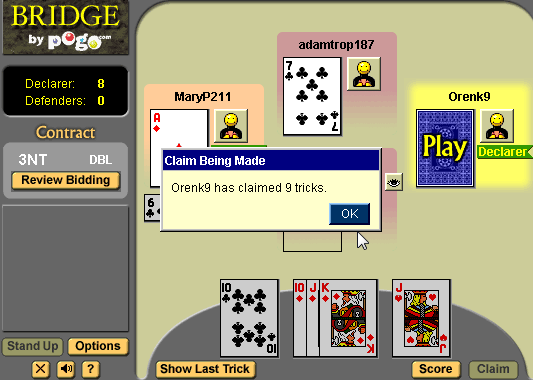Claiming Tricks is a move used by the declarer or either of the defenders that a certain number of tricks will be won. The amount of tricks claimed can be all of the remaining tricks or some of the remaining tricks thereby conceding the others to their opponents.
Claiming tricks in Contract Bridge is permitted and is based on Rule 68 which states “”any statement… that a contestant will win a specific number of tricks. A contestant also claims when he suggests that play be curtailed, or when he shows his cards.”
When a player claims some or all of the remaining tricks he or she should be 100% sure of exactly the course of the remaining action. The claimer should also state their line of play that backs up his or her claim. The line of play that should be stated tells the other players the intention of why the claim was made and the course of action that would have occurred if the hand had been played out.
Issues arise in claiming tricks when a bad claim is made. A bad claim is one in which the course of action may not have occurred based on the defenders cards which would have altered the number of tricks won by each pair.
Play stops after a claim because a blocked claim would give an unfair advantage to the claimer in that he or she now knows more information based on the fact that his or her opponents may have a play that could take an additional trick(s).
It is generally best to play out the hand further unless you are positive your claim will be valid. An invalid claim in Duplicate Bridge will involve the director having to be called over to study the situation and determine the number of tricks that would likely to have been won by the claimer. The director will take into account any reasonable plays by the opponents that may have stopped tricks from being taken by the claimer.

